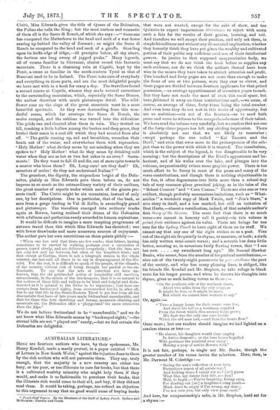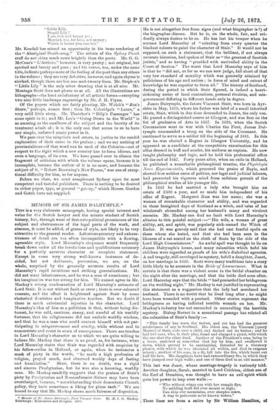AUSTRALIAN LITERATURE.*
HERE are fourteen authors who have, by their spokesman, Mr. Henry Kendall, made a manly protest, in a paper entitled " Men of Letters in New South Wales," against the injustice done to them by the rich settlers who will not patronise them. They say, truly enough, that the majority in a new country are either too busy, or too poor, or too illiterate to care for books, but that there is a cultivated wealthy minority who might help them if they would, and make it so fashionable to purchase their books, that the illiterate rich would come to their aid, and buy, if they did not read them. It would be taking, perhaps, too refined an objection to this argument to say that no good would come of buying books Punch Staff Papers. By the Members of the Staff of Sydney Punch. Sydney and Melbourne; Gordon and Goteh: that were not wanted, except for the sake of show, and too Quixotic to expect impecunious litte'rateurs to reject with scorn such a fate for the results of their genius, learning, and toil.
And therefore we will accept their position, and only ask them, in simple friendliness and without any ill-natured implication, whether they honestly think they have yet given the wealthy and cultivated portion of their public any sufficient evidence of their intellectual powers. In justice to that supposed unappreciative body, we must say that we do not think the book before us supplies any such evidence, nor do we think the authors thereof have been wise in the means they have taken to attract attention and profit. Two hundred and forty pages are not more than enough to make the fame of one or two persons, were they ever so clever, and these pages are divided between fourteen applicants for that prized possession,—au average apportionment of seventeen pages to each. But they have not made the most of even this small space, but have Jrittered it away on three contributions each,—we mean, of course, an average of three, forty-three being the total number. And even here they do not rest in this waste of opportunity, but are so ambitious—six out of the fourteen—as to send both prose and verse to witness to the comprehensiveness of their talent.
We have read the volume very carefully, but we confess that not one of the forty-three papers has left any abiding impression. There is absolutely not one that we are likely to remember ; except perhaps the one called " Kai Tamara and the Devil," and even that owes more to the grotesqueness of the sub- ject than to the power with which it is treated. The cannibalism, which is the subject of the legend, is too disagreeable to be very amusing ; but the descriptions of the Devil's appearance and be- haviour, and of his walks over the lake, and plunges into the volcano, unquestionably evince some graphic power. There is too much effort to be funny in most of the prose and many of the verse contributions, and though there is nothing objectionable in the fun, it often degenerates into little more than a school-boy tale of very common-place practical joking, as in the tales of the " School Concert " and " Cave Canem." There are also one or two evident, though probably unconscious imitations, such as " What- anidea !" a wretched copy of Mark Twain, and " Jim's Share," a nice story in itself, and a less marked, but still an imitation of
Bret Harte,—almost a versification, indeed, of that notable author's first Story of the Sierras. The mere fact that there is so much verse—we cannot in honesty call it poetry—in this volume is prima facie evidence against its value. Poets are beings far too rare for the Sydney Punch to have eight of them on its staff. We cannot say that any one of the eight strikes us as a poet. Five
out of the eight sin frequently in rhyme, or measure, or both; a sixth has only written semi-comic verses ; and a seventh has done little better, assuring us, in seventeen fairly flowing verses, that "I see
her now my sweetheart long ago." Mr. Samuel Hawker Banks, who seems, from the number of his poetical contributions,— nine out of the twenty-eight poems—to be par excellence the poet of the society, and who has many pleasing lines, is obliged, like his friends Mr. Kendall and Mr. Stephen, to take refuge in blank
verse for his longer poems, and when he throws his thoughts into rhyme, gives us such halting verses as these :—
" On the southern side of the northern shore, About two miles from the city away,— It might be less, or it might be more,
But which we cannot here venture to say."
Or, again :— " 'Twas a happy home, for their wants were few, And these his toil as a woodman supplied From the forest which then around them grew ;
His boat was the only one care beside Which the old man had,—and thus the hours flow."
Once more ; lest our readers should imagine we had lighted on a. careless stanza or two :— " He absent, his daughter would time employ
In duties domestic ; or the lone hours beguiled With pastimes the youthful ever enjoy : Making a posy of native flowers wild."
It is not fair, perhaps, to single out Mr. Banks, though the greater number of his verses invite the selection. Here, then, is Mr. Derwent M. Coleridge :- "Seeing the sun's reflection of your face, Portraiture truest of all artists true !
And looking there I vainly try and [sic] guess What like, my dainty lady fair, aro you! Well, to begin :—You've laughing, loving eyes, For shading out [sic] a laughter-loving heart— Mind, don't be angry if I'm wrong, my dear I've not seen you, but only view your carte."
And here, for companionship's sake, is Mr. Stephen, hard set for a rhyme :—
"Little Lily. Stupid Lily !
I am rich and happy yet ; Married, too, for love, not money ; Which is better you can bet."
Mr. Kendall has missed an opportunity in his tame rendering of the " Aboriginal Death-song." The artists of the Sydney Punch staff do not shine much more brightly than the poets. Mr. G. G. McCrae's " L'Arrivee." however, is very pretty ; not original, but spirited and breezy and pure ; and his verses, too, under the same title, indicate perhaps more of the feeling of the poet than any others in the volume ; they are very defective, however, and again rhyme is shirked, though there are but one-and-twenty lines. Mr. Stephen's " Little Lily " is the only other drawing that is at all nice. Mr. Montagu Scott does not please us at all. All the illustrations are lithographs—the least satisfactory of all artistic forms—excepting two nice little landscape engravings by Mr. J. H. Flynn.
Of the papers which are fairly pleasing, Mr. Wolch's "Jim's Share," perhaps, comes first ; then Mr. Coleridge's "Laura," a very mild little story. Mr. Thatcher's "Billy's Passenger" has some spirit in it ; and Mr. Lee's "Going Down in the World" is as amusing as the smallness of the subject and the brevity of its treatment admit of ; it is the only one that seems to us to have any simple, unforced comic power in it.
We pass over the misprints and errors, in justice to the candid explanation of their cause in the preface ; and we say nothing of provincialisms—if that word can be used of the Colonies—out of respect to the right which a new country has to form idioms, and even a language, of its own. We have passed over in silence the fragment of criticism with which the volume opens, because it is incomplete, because the author of it is no more, and because the subject of it, "Robert Browning's New Poems," was one of excep- tional difficulty for him, as for anyone.
Before we close, we must compliment Sydney upon its most competent and tasteful publishers. There is nothing to be desired in either paper, type, or general " get-up," which Messrs. Gordon and Gotch have not supplied.



































 Previous page
Previous page